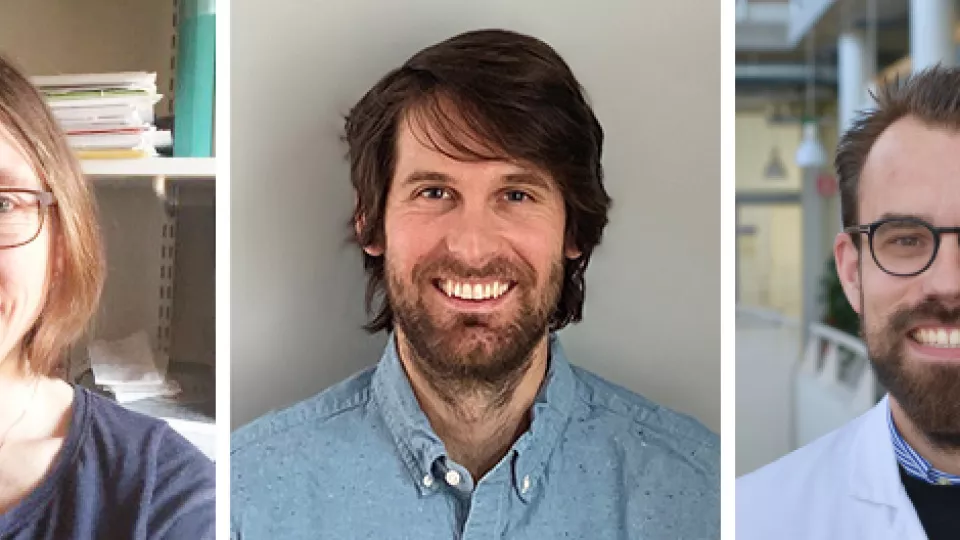In total, there are now 24 research team leaders recruited to the WCMM at Lund University – 14 clinical researchers and 10 basic researchers. Together, they drive forward research within regenerative medicine and in a translational setting – from molecule to man.
The three new researchers are:
Lisa Påhlman, Wallenberg Molecular Medicine Clinical Researcher and infectious disease physician, conducts research on different aspects of respiratory infections. Above all, her research team studies the microbiome in the airways of lung transplant recipients and patients with cystic fibrosis (CF). There are changes in the airway microbiomes of both patient groups due to their underlying disease and they must be treated frequently with antibiotics.
Acute and chronic respiratory infections are common among both patient groups and individuals are often colonised by different pathogens.
“There is a lack of knowledge regarding many of the different microbes present in the airways of these patients. The research questions that my colleagues and I are interested in, and want to investigate, are”, says Lisa Påhlman:
- Can we identify specific microbes in the airway microbiome that either cause, or protect against, respiratory infections?
- What is the clinical importance of the different microbes present in the airways of these patients?
- Which bacterial virulence factors (pathogenic factors) are important for the establishment of acute and chronic airway infections?
“WCMM is a unique platform for translational research. Funding from WCMM allows me to continue and develop my line of research in a unique environment for new and translational research cooperation”, says Lisa Påhlman.
Nicholas Leigh, Wallenberg Molecular Medicine Fellow, recruited from Harvard University, Boston, USA. His research aims to understand how our immune system can facilitate, and contribute to, regeneration (recreation, renewal) of tissue in the event of damage or after amputation of a body part. When we are injured, our wounds generally heal, but the tissue is not completely recreated, and instead scarring arises in the damaged area. Similarly, if a body part has to be amputated, it does not grow back again. However, there are species, such as the salamander, which have a completely different ability to regenerate and fully recreate a lost body part. We do not yet know very much about why there is such a difference between the species. There is, however, a clear difference between the salamander and humans regarding how the respective species’ immune system responds to injury.
“That is why we use the salamander as our model system. By combining methods from immunology and regenerative biology with ground-breaking so-called omics-based technologies and methods, we can study how the salamander’s immune system works and enables regeneration and wound healing without scarring. With an understanding of the salamander’s immune system, we hope in the future to facilitate treatments designed to utilise the immune system in such a way that it also promotes regeneration in humans”, says Nicholas Leigh, and continues “WCMM is an ideal environment for facilitating cooperation with other researchers who are also focusing on regeneration and equally important is the direct link to clinical cooperation.”
Andreas Edsfeldt, Wallenberg Molecular Medicine Clinical Researcher, is a resident physician in cardiology whose research focuses on cardiovascular medicine and more specifically on why atherosclerotic plaques (plaques in hardening of the arteries) tend to rupture more often among individuals with type 2 diabetes. Cardiovascular disease is usually caused by atherosclerotic plaques in the walls of blood vessels. As the disease progresses, the plaques grow, they become inflamed and there is a growing risk that they will rupture, which may lead to a blood clot. Diabetes means an increased risk of cardiovascular disease and individuals with type 2 diabetes have more so-called vulnerable plaques that are more prone to rupture.
“An increasing number of people worldwide are contracting diabetes and diabetics have an increased risk of getting cardiovascular disease. There are several theories about why this is so, but we have been able to show that it partly depends on the fact that diabetics have an impaired capability for regeneration and for healing damage in the blood vessel walls. The aim of our research is to identify the mechanisms behind the impaired capability for tissue repair and regeneration in atherosclerotic plaques from patients with type 2 diabetes”, says Andreas Edsfeldt.
Andreas Edsfeldt combines new sequencing and omics analyses of human plaque samples from one of the largest atherosclerotic biobanks in the world using unique in vitro studies to characterise and imitate the human atherosclerotic disease. Through this he hopes to identify new therapeutic targets and markers for preventing atherosclerotic complications among people with type 2 diabetes.
“Being a part of the unique and creative environment created by WCMM, with considerable opportunities for interdisciplinary cooperation, will have a considerable effect on the project as well as on my personal development as a researcher”, concludes Andreas Edsfeldt.
